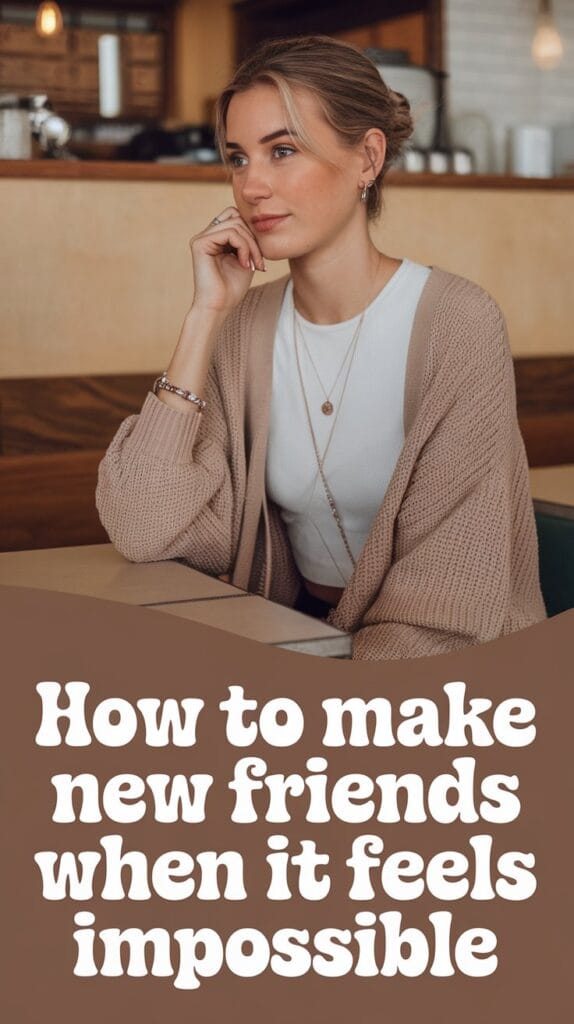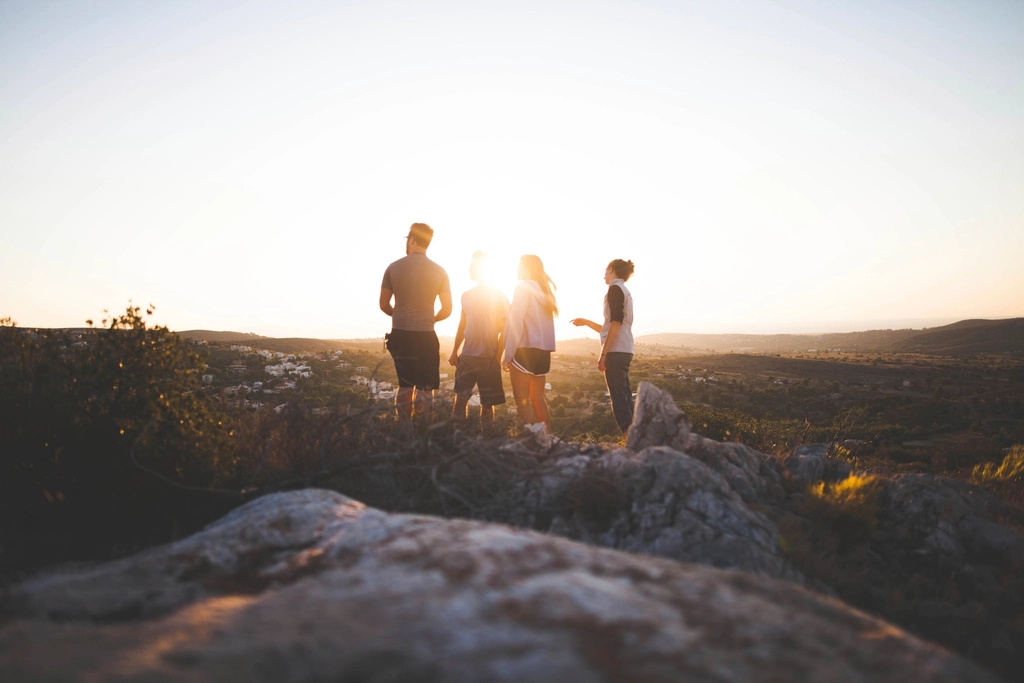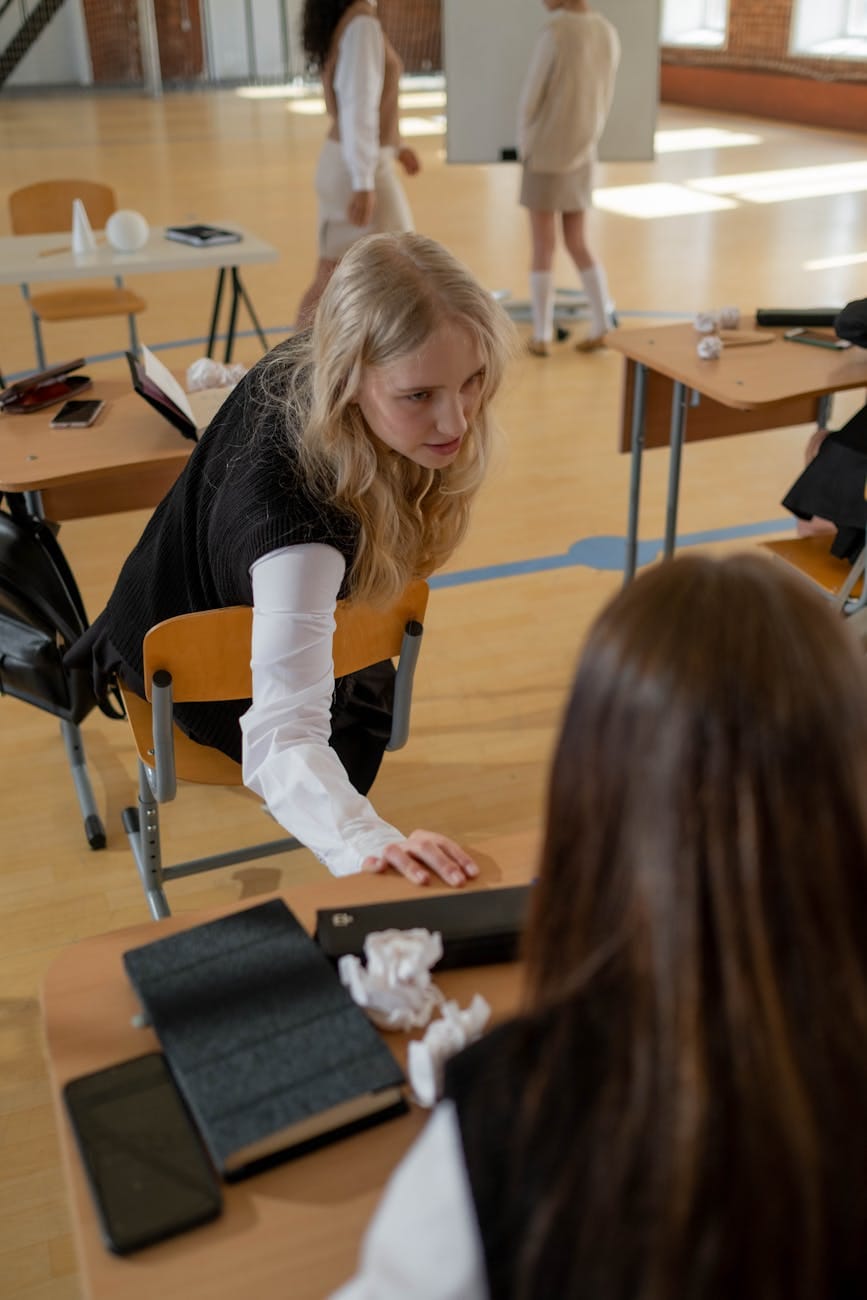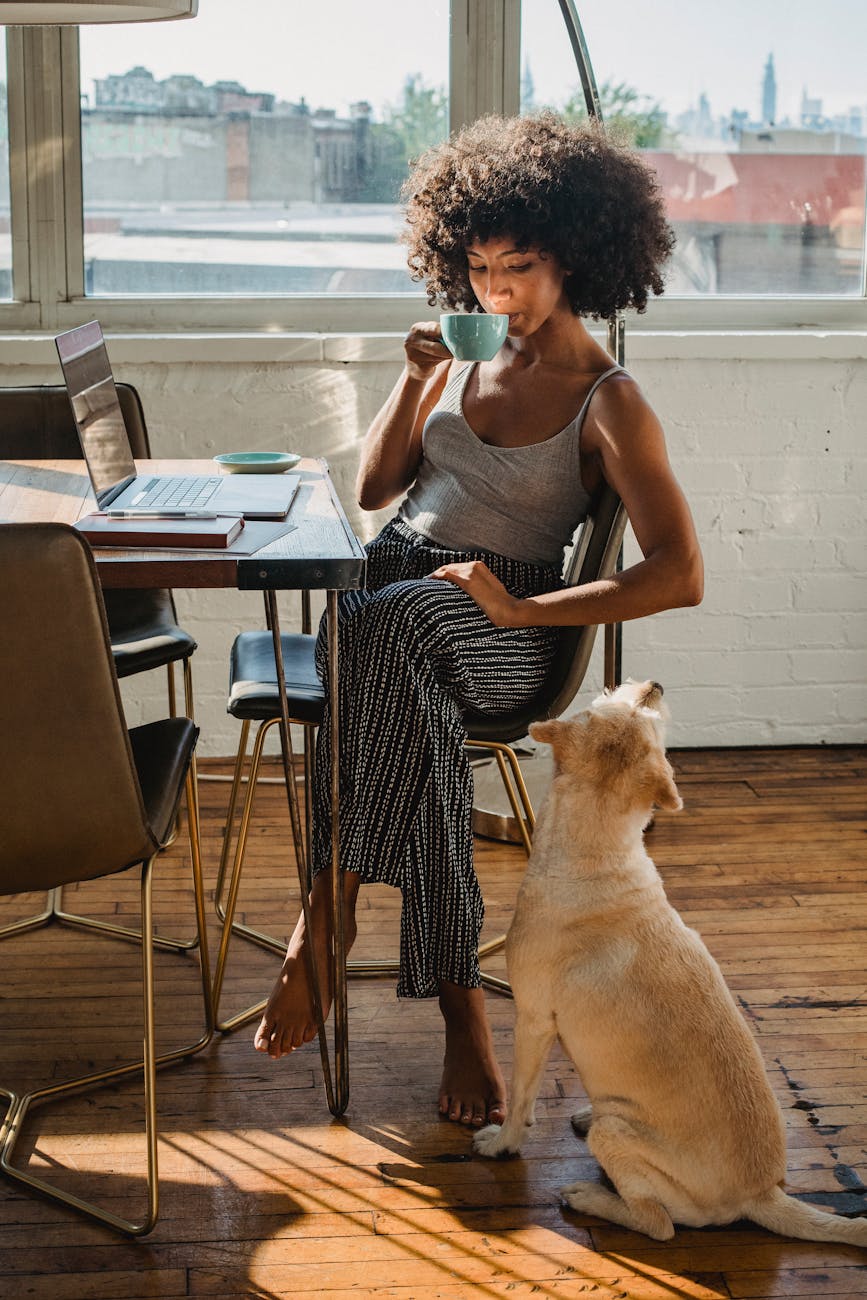Remember when making friends was as easy as sharing your crayons? Yeah, those days are long gone. If you’re struggling to figure out how to make friends as an adult, trust me, you’re not alone, and you’re definitely not weird for finding this hard.
I spent my twenties convinced something was wrong with me because I couldn’t just “click” with people like I used to. Turns out, adult friendships are just different.
Pin this ↓ to save the list

They require intentionality, patience, and a willingness to feel awkward sometimes. But here’s the good news: once you understand how to make friends as an adult, the process becomes way less intimidating.
Let me walk you through everything I’ve learned (sometimes the hard way) about building genuine connections when you’re past the age where proximity does all the work for you.
Why Making Friends as an Adult Feels So Hard

You know what nobody tells you about adulthood? That making friends becomes weirdly complicated. When you’re a kid, friendships just happen. You sit next to someone in class, and boom, instant friend.
As an adult? You need to coordinate schedules, overcome social anxiety, and somehow find the courage to say “wanna grab coffee?” without overthinking it for three days.
Here’s the reality: life circumstances don’t naturally throw us together anymore. There’s no shared lunch period or mandatory group projects forcing interaction.
You’re juggling work, maybe a family, personal goals, and whatever energy you have left goes toward binge-watching that show everyone’s talking about.
The pressure we put on ourselves doesn’t help either. You might look around and think everyone else has their friend groups figured out. Spoiler alert: they’re probably thinking the same thing about you.
Accept this simple truth: it takes more effort now, and that’s completely normal. Once you stop beating yourself up about it, you can actually start doing something about it.
And if you’re feeling like this whole process is impossible, I wrote about how to make new friends when it feels almost impossible with specific mindset shifts that help.
8 Proven Ways to Make Friends as an Adult
1. Start Small With Casual Conversations

Forget the idea that you’re going to meet your new best friend at next week’s networking event. That’s movie logic, not real life. The actual path to friendship is way more mundane, and that’s a good thing.
Begin with casual conversations wherever you already are. Chat with your coworker about their weekend. Exchange a few words with the person you see at yoga class every Tuesday. Say hi to your neighbor instead of doing that awkward head-nod thing.
These tiny interactions might feel pointless, but they’re not. They’re building blocks. Each small exchange creates familiarity, and familiarity is what eventually opens the door to actual friendship.
I used to dismiss these moments as “not real connections.” Then I realized my closest work friend started out as someone I occasionally complained to about the coffee machine. Small talk isn’t the enemy. It’s the foundation.
2. Show Up Consistently (Not Just Once)
Here’s something that changed my perspective completely: consistency beats chemistry. Stop waiting for that instant soul connection you see in movies. It’s rare, and honestly, it’s not how most adult friendships form.
What actually works? Repeated interactions over time. Sign up for that weekly book club. Keep attending the same fitness class. Volunteer at the same place regularly. The key word here is regularly.
When you see the same faces week after week, conversations naturally progress from “nice weather” to “how was your week?” to “want to grab lunch?” You’re not forcing anything. You’re just creating opportunities for friendship to develop at its own pace.
FYI, this is why workplace friendships happen so easily. You’re stuck in the same place with the same people, so connections form almost by accident. Recreate that structure in other areas of your life, and you’ll see similar results.
Why Consistency Works
Familiarity breeds comfort. The more you see someone, the easier it becomes to move past surface-level chit-chat. You start remembering details about each other’s lives. You develop inside jokes. Small moments add up to something bigger.
Think of it like watering a plant. One good conversation isn’t enough. You need steady, repeated care for something to grow. The same principle applies to friendships.
3. Be The Person Who Follows Up
Let’s address the elephant in the room: someone has to make the first move, and it might as well be you. I know it feels vulnerable. What if they say no? What if they think you’re weird? What if they’re just being polite?
Here’s what I learned after years of waiting for other people to reach out: they’re usually waiting for you to do it first. Most adults are in the exact same boat, feeling equally uncertain about whether they should initiate.
So after a good conversation, send that text. Suggest coffee. Share that article you mentioned. Invite them to join you for something you’re already doing. It takes the pressure off because you’re going anyway.
Yes, sometimes people will be genuinely busy or not interested. That’s okay. The ones who respond positively? Those are your people. And trust me, they’re usually relieved someone else took the initiative.
(And if rejection scares you, check out my guide on making friends when it feels impossible where I talk about getting comfortable with rejection.)
Easy Ways to Follow Up
- Send a quick message within 24 to 48 hours referencing something you discussed
- Extend low-pressure invitations like “I’m checking out this new coffee shop Saturday if you want to join”
- Share content related to your conversation (articles, memes, recommendations)
- Be specific with plans instead of vague “we should hang out sometime” statements
- Keep it casual so they don’t feel pressured to commit
The follow-up is where acquaintances turn into actual friends. Don’t skip this step just because it feels scary.
4. Try New Places and Activities
If your social life feels stagnant, you need to change where you’re showing up. Hanging out at the same places with the same routine will only get you more of what you already have. And if you’re reading this, that’s probably not enough.
I’m not saying abandon your favorite spots entirely. But add variety. Try that painting class you’ve been curious about. Join a local sports league (even if you’re terrible at sports). Check out community events. Hit up different coffee shops or parks.
The goal isn’t to collect contacts like Pokémon cards. It’s to position yourself in spaces where connections can naturally happen with people who share your interests.
When you meet someone at a rock climbing gym, you already have something in common. Conversations flow easier. You have built-in reasons to see each other again. The shared activity does half the work for you.
Best Places to Meet New People
- Fitness classes like yoga, spin, CrossFit, or running clubs
- Hobby-based groups such as photography walks, book clubs, or gaming meetups
- Volunteer organizations aligned with causes you care about
- Adult education classes for cooking, language learning, or crafts
- Local Facebook groups or Meetup.com events in your area
- Dog parks if you have a dog (honestly, dogs are friend-making cheat codes)
Pick activities you genuinely enjoy, not just ones where you think you’ll meet people. Authenticity matters way more than strategy.
5. Give Friendships Time to Grow
Real talk: rushing intimacy is the fastest way to kill a potential friendship. I’ve made this mistake more times than I care to admit. You have one great conversation, and suddenly you’re planning weekend trips and expecting daily texts.
Then things fizzle out because you jumped ten steps ahead.
Adult friendships need time to breathe. Some people you meet will stay casual acquaintances, and that’s valuable too. Others might slowly become close friends over months or years. Both outcomes are completely normal.
Trust builds through repeated positive experiences, not through forced closeness. Share gradually. Let vulnerability happen naturally as you learn you can rely on each other.
I’ve found that my most solid friendships developed slowly. Sometimes so slowly I didn’t even realize they were deepening until I looked back and thought, “huh, when did this person become one of my closest friends?”
Signs a Friendship Is Developing Naturally
- Conversations feel easy and unforced
- You both initiate contact fairly equally
- You can be comfortable in silence together
- They remember things you’ve told them
- Plans happen without tons of back-and-forth scheduling drama
Patience isn’t just a virtue in friendship. It’s basically a requirement.
6. Don’t Overlook Online Friendships

I used to be skeptical about this. Online friends? Aren’t those just internet strangers? Then I met someone in a book discussion forum two years ago, and we still talk regularly.
My brother found his entire friend group through Instagram (they’re all into motorcycles and meet up for rides constantly).
Online spaces can spark genuine connections, especially if your lifestyle or location limits face-to-face opportunities. Discord servers, Reddit communities, specialized Facebook groups, hobby forums… these places gather people with shared interests who are already primed for connection.
The trick is engaging authentically. Don’t just lurk. Comment thoughtfully. Join discussions. Be curious about other people’s perspectives. Many online friendships eventually translate into real-life meetups, but even if they don’t, they can still be incredibly meaningful.
Where to Look for Online Connections
- Discord servers related to your interests (gaming, reading, fitness, etc.)
- Facebook groups for local events or specific hobbies
- Goodreads if you love books and want to discuss them
- Reddit communities where you can engage in ongoing conversations
- Bumble BFF or similar friend-finding apps (yeah, these exist)
Treat online interactions like you would in-person ones. Show up consistently, be genuine, and follow up when you connect with someone.
7. Be Interested, Not Interesting
Here’s where a lot of people get it wrong: they think they need to be fascinating to make friends. You don’t. What you need to be is genuinely curious about other people.
Stop worrying about whether you’re coming across as cool or witty or impressive. Instead, put your energy into actually getting to know the person in front of you. Ask questions. Listen (like, really listen, not just wait for your turn to talk). Remember details they share and bring them up later.
People don’t remember the most interesting person in the room. They remember the person who made them feel heard and valued.
I’m naturally introverted and used to stress about having good stories or being entertaining. Then I realized my best conversations happened when I shut up and let the other person talk about their passions. Showing genuine interest builds connection faster than any clever anecdote.
How to Show Real Interest
- Ask follow-up questions that go deeper than surface level
- Remember details from previous conversations
- Put your phone away when you’re talking with someone
- Make eye contact and use body language that shows you’re engaged
- Don’t interrupt or turn the conversation back to yourself constantly
This doesn’t mean being passive or never sharing about yourself. It means approaching new connections with curiosity instead of performing for approval.
8. Focus on Quality Over Quantity
Let’s clear something up: you don’t need a ton of friends to have a fulfilling social life. A few solid, dependable friendships beat dozens of surface-level connections every single time.
Stop measuring your social success by how packed your calendar is. Some of the loneliest people I know have the busiest social lives because none of those connections go deeper than small talk and Instagram likes.
Focus your energy on relationships that feel mutual, respectful, and genuinely energizing. The ones where you can be yourself without editing or performing. Where there’s reciprocity. They show up for you like you show up for them.
Not every person you meet needs to become a close friend. Most won’t, actually, and that’s fine. What matters is identifying and nurturing the connections that have real potential.
What Quality Friendships Look Like
- You feel energized (not drained) after spending time together
- There’s genuine reciprocity in effort and communication
- You can be authentic without fear of judgment
- They celebrate your wins instead of competing with you
- Conversations flow easily and feel natural
- You trust them with your real thoughts and feelings
A tight circle of three to five solid friends will serve you better than a contact list full of people you barely know. Quality always wins.
Accept That Some Attempts Won’t Work
Not every potential friendship will work out, and you need to make peace with that. Sometimes the chemistry just isn’t there. Sometimes life circumstances don’t align. Sometimes you follow up and get crickets in return.
None of that means you did something wrong. It just means that particular connection wasn’t meant to develop further, and that’s completely normal.
I’ve invited people to hang out who declined and never reciprocated. I’ve had promising conversations that never led anywhere. I’ve joined groups where I didn’t click with anyone. All of that is part of the process.
The key is not taking it personally and not letting a few misses discourage you from trying again. Making friends as an adult is partly a numbers game. You need to create multiple opportunities for connection because not all of them will pan out.
Think of it like dating (but with less drama and better success rates). You wouldn’t expect every person you go out with to become your life partner. Same logic applies to friendship.
Bring Your Real Self
This might be the most important thing I can tell you: don’t try to be someone you’re not. Any friendships built on a false version of yourself won’t last, and maintaining the facade is exhausting.
You like staying home and reading? Own it. Find people who get that. You’re really into niche hobbies? Perfect. Those communities exist, and they’re full of potential friends.
Pretending to enjoy things you don’t or hiding your actual interests might seem like a shortcut to fitting in, but it backfires. You’ll either attract people you don’t actually vibe with, or you’ll constantly feel like you’re performing.
The right people will appreciate the real you. Those are the friendships worth having anyway.
IMO, the older I get, the less patience I have for inauthentic connections. Life’s too short to spend time with people you can’t be yourself around. 🙂
Keep Making the Effort
Here’s the unglamorous truth: making friends as an adult requires sustained effort. You can’t do it once and check it off your list. You need to keep showing up, keep reaching out, keep creating opportunities for connection.
Some weeks you won’t feel like going to that meetup or texting that person back. Do it anyway. Friendships die from neglect more often than from conflict. The relationships you maintain are the ones you actively prioritize.
This doesn’t mean exhausting yourself or forcing connections that clearly aren’t working. It means being consistent with the ones that show promise. Following through on plans. Checking in regularly. Being present and engaged when you’re together.
I won’t lie. There are times when making the effort feels like too much work. But then I think about how good it feels to have people in my life who get me, and suddenly that text isn’t so hard to send.
The payoff is worth the effort. You just have to stick with it long enough to see results.
Your People Are Out There
Let’s end with some perspective: while you’re reading this wondering how to make friends as an adult, there are dozens of people in your area thinking the exact same thing. Your future friends are out there hoping to meet someone like you too.
They’re also feeling awkward at that community event. They’re also wondering if they should send that follow-up text. They’re also questioning whether adult friendships are even possible anymore.
The difference between staying lonely and building a solid friend group is simply taking action. Starting those small conversations. Following up when you connect with someone. Showing up consistently. Being yourself and genuinely interested in others.
It’s not magic, and it won’t happen overnight. But if you commit to putting yourself out there and nurturing the connections that feel right, you’ll look up six months from now and realize you’ve built something real.
Making friends as an adult might be harder than it used to be, but that doesn’t mean it’s impossible. You’ve got this. Now get out there and start those awkward conversations. Your people are waiting. :/
Take One Small Step This Week
Remember, every single adult friend you might make is also navigating this weird phase of life where friendships take intentional effort. Nobody has it all figured out. We’re all just doing our best to create meaningful connections in a world that doesn’t make it particularly easy.
The skills you need aren’t complicated: show up regularly, be genuine, take initiative, and give relationships time to develop. That’s literally it. Everything else is just variations on these themes.
Start with one small action this week. Send one text. Sign up for one new activity. Strike up one casual conversation. Each tiny step forward is progress, and progress compounds over time.
Your social life doesn’t transform overnight, but it absolutely can transform. I’ve seen it happen for myself and countless others who thought they’d missed their window for making friends. You haven’t. The window’s still wide open. You just need to walk through it.
Now stop reading about making friends and go actually do it. Your future friend group is waiting for you to make the first move.

